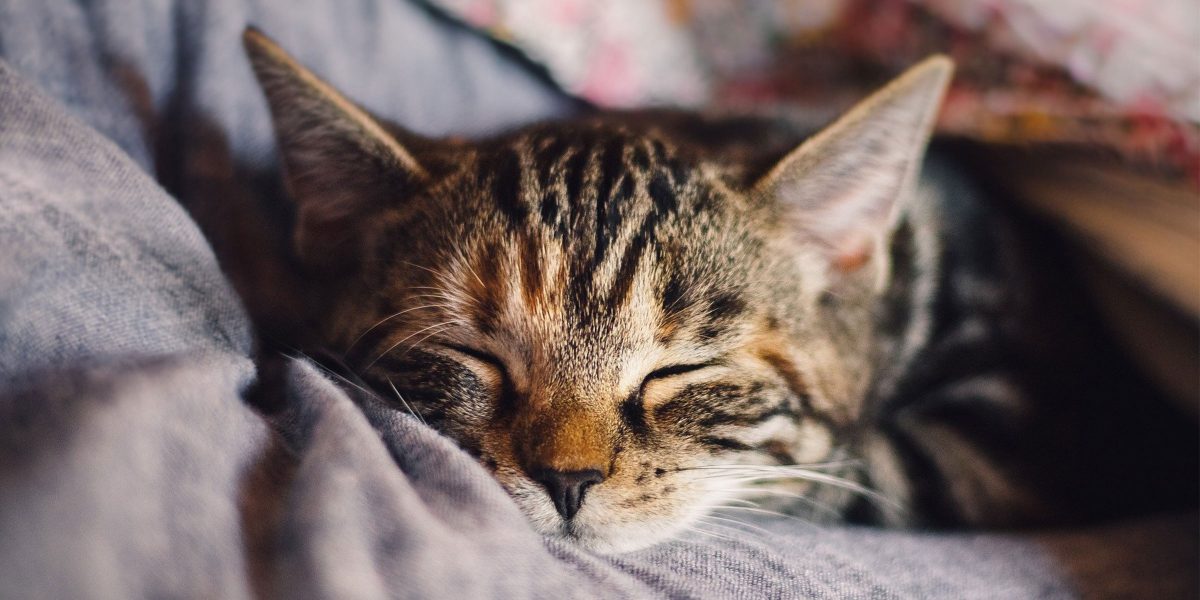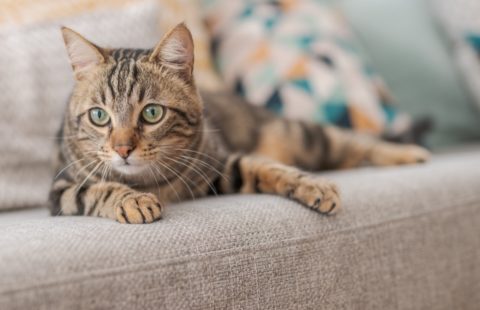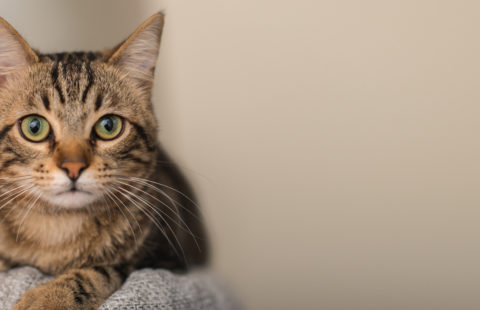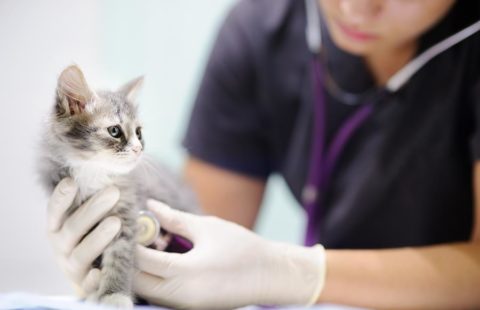This month’s Spotlight on Science focusses on some research conducted by iCatCare Feline Wellbeing Panel Member and resident contributor to Spotlight on Science, Dr Lauren Finka. Over to Lauren…..
My scientific training tells me that using terms such a ‘fur babies’ to refer to our pets is very anthropomorphic (i.e. attributing human qualities to animals) and should be avoided. However, I’m guilty as charged, and I often used to catch myself calling my late rescue cat Barry my ‘furry cat child’. Indeed, it’s an incredibly common phenomenon for us to see our pets as integral members of our family. The loss of a pet can also be devastating, and some may argue as bad (or in certain cases worse) than grieving for a person. It’s clear that the bonds we form with animals can be incredibly strong, and research certainly demonstrates the many positive impacts of pet ownership on our health and wellbeing.
We as owners will often go to extraordinary lengths to provide the best of care for our pets (again, guilty as charged!). You only have to look around the average pet store to see how much we like to lavish upon and spoil them. Using myself as an example, my cat Barry loved the outdoors a lot, but not so much the cold weather. For this reason, he was the proud owner of not one but three different outdoor ‘cat houses’ to keep him cosy, even in the harshest of cold spells. I even drilled a hole in the side of my house so that I could put a 24hr heated pad into one of his homes! He always could come indoors whenever he wanted but enjoyed spending time outdoors with the additional comfort of warmth.
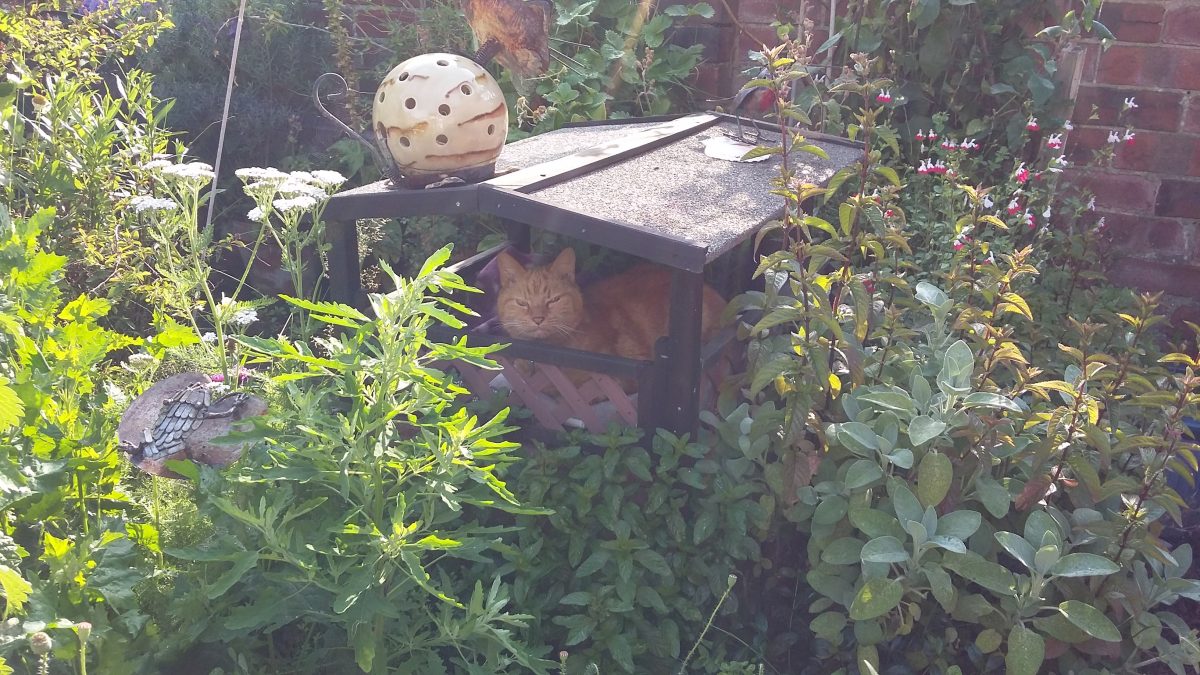
Photo credit: Dr Lauren Finka
However, even with the best of intentions, there’s no denying that we are a very different species, and there are likely to be certain things that we do (or don’t do) which impact on the wellbeing of our cats without us even realising or understanding why. For example, many cats can be very sensitive to changes in their environment including new sounds and smells, visitors to the house, or the moving of furniture etc. In many cases we may not be aware of the negative impact these sorts of changes have upon them until we see very noticeable (often undesirable) signs, such as the cat toileting outside of the litter box, grooming much more than usual, or avoiding certain areas of the house.
There are also potentially other, more subtle ways that we impact on our cat’s wellbeing, and these may be linked to aspects of our personality. In people, research indicates that the personality of a parent can both positively and negatively influence their children. For example, evidence suggests that parents that are more neurotic or emotionally unstable can be less warm, but more overprotective and overly anxious in their parenting. They may be more likely to provide a harshly controlled, but unstructured environment. This in turn can lead to children displaying more behavioural problems such as fighting, crying and whining, increased shyness, anti-social behaviours, decreased empathy, obesity and reduced wellbeing. On the other hand, parents that are less neurotic but more agreeable, conscientious and open may provide warmer parenting to their children with more structured, gentle control with less discipline and overprotectiveness. As a consequence, their children may benefit from less behavioural and emotional problems.
So what does this have to do with our cats? Could there be a similar link between owners and their cats? This is what myself and colleagues at Nottingham Trent University and the University of Lincoln set out to investigate in our newly published study.
What did we do?
We created an online survey which we asked cat owners to complete. Owners answered multiple choice questions about their cat’s behaviour, health and wellbeing. These included:
Cat behaviour questions:
- How friendly the cat was towards the owner
- How frequently the cat behaved aggressively
- How frequently the cat seemed frightened or anxious
- How aloof or avoidant the cat was
- Whether the cat exhibited any ‘behaviour problems’
Cat health and lifestyle questions:
- The age of the cat and its breed (whether pedigree or non-pedigree)
- If the cat had any medical issues and whether they displayed any ‘sickness behaviours’ linked with stress (e.g. frequency of vomiting, diarrhoea, constipation, cystitis, their coat condition and weight)
- Whether the cat was given free outdoor access, kept strictly indoors or allowed controlled or supervised outdoor access.
Owners were also asked about their own personality, which was assessed using the ‘Big Five Inventory’ or BFI. The BFI is a very common type of personality assessment used in psychological research which measures individuals relative to five key personality traits. These are:
- Openness: relating to intellect, imagination, and independent-mindedness
- Conscientiousness: how orderly, responsible and dependable a person is
- Extraversion: how talkative, assertive and energetic a person is
- Agreeableness: how good natured, cooperative and trustful a person is
- Neuroticism: measures levels of calmness and emotional stability. People scoring higher in this trait are more likely to regularly experience negative emotions such as worry and anxiety and display more hostility to others
In a very short space of time, the survey received an incredible response from all you lovely cat people! We received over 3000 responses in a matter of weeks, which was phenomenal and gave us a brilliant database to work with.
What were the main findings?
Some really exciting results emerged, showing a very similar relationship to that previously identified in parents and children. We found that owner personality was related to a range of factors relevant to cat wellbeing.
We found that cat owners who scored higher in the trait Neuroticism were more likely to state that they owned a non-pedigree than pedigree cat, but were less likely to provide the cat with free access to the outdoors (they either kept their cat strictly indoors or restricted outdoor access in some way). More neurotic owners also reported their cats as having more on-going medical conditions, that their cat was overweight, displayed more frequent stress-linked sickness behaviours, ‘behavioural problems’ and aggressive and anxious/fearful behaviours.
In contrast, we also found that other personality traits were associated with more positive aspects of the cat’s wellbeing. For example owners scoring higher in extroversion were more likely to state they provided their cat with free access to the outdoors, whilst owners higher in agreeableness reported greater satisfaction with their cat as well as their cat being of a normal weight. Owners scoring higher in conscientiousness also reported their cats as displaying less anxious/fearful, aggressive, aloof/avoidant, but more friendly behaviours towards them.

Photo credit: Dr Lauren Finka
What we still don’t know: Correlation isn’t the same as causation
Whilst we found evidence of a correlation between owner personality and the behaviour and wellbeing of their cats, we weren’t able to state whether owners are directly causing this, or whether more neurotic owners are just more likely to choose cats which have more health problems, or that are less friendly. More neurotic owners might also have a tendency to simply describe their cats in a more negative way, or be more aware of their cat’s health. However, more neurotic owners were also more likely to keep their cats strictly indoors, and this was linked to more stress-linked sickness behaviours in their cats. This evidence would suggest that more neurotic owners are potentially behaving in a more over-protective way when it comes to managing their felines. Other factors are of course relevant when choosing whether to let a cat outside.
Why is this study useful?
So how can we use this information to help our small furry children have the best possible experience living alongside us?
Historically little attention has been paid to the impact of owner personality on the wellbeing of companion animals such as cats. This research helps to identify a clear link between the two and highlights the need for further studies into this phenomenon. Whilst we can’t easily change our personalities to better suit our cats, we can certainly be more aware of how our mood might affect our beloved felines, particularly if we’re feeling stressed or anxious. We can also try to ensure we aren’t being over-protective or overly anxious when it comes to how we keep them – are we allowing our cats to be sufficiently independent? Could we be a little less controlling? Are we ensuring we avoid punishing the cat and instead using positive encouragement? If we currently keep our cats indoors, perhaps question whether this is actually in their best interest, or could they be given the some cat-friendly safe outdoor space to roam and explore?
Thank you, Lauren, for insight into your fascinating research. While we cannot all change our personalities, nor should we necessarily want to as our individuality is what makes our world so wonderful, it is important to be able to recognise when our behaviour is affecting our cats, particularly if the effect is negative. Understanding signs of our cats’ comfort and discomfort (both physical and mental) is therefore crucial – if you want to learn more on these topics, why not try our short courses ‘Cat Care for Life: An Introduction to Feline Health’ and ‘Getting to Know Your Cat: An Introduction to Feline Behaviour’.
This piece is edited from an article first published in Your Cat magazine, written by Lauren Finka. We are extremely grateful to Lauren and Your Cat magazine for their generosity in allowing us to utilise and repurpose this article and helping us share cat science to improve the understanding of cats internationally.
Article reference:
Finka LR, Ward J, Farnworth MJ, Mills DS (2019) Owner personality and the wellbeing of their cats share parallels with the parent-child relationship. PLOS ONE 14(2): e0211862. https://doi.org/10.1371/journal.pone.0211862



